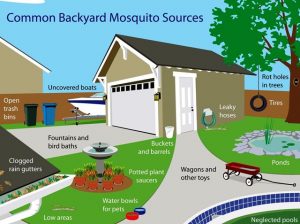The most effective way to reduce the risk to West Nile Virus is to prevent exposure to mosquito bites. Mosquito bites can be avoided both by behavior choices, and by eliminating mosquito breeding habitat. It takes only a couple of teaspoons of water for a mosquito to lay eggs. Simple preventative measures can help stop breeding and make your home and living conditions enjoyable and comfortable. The following are methods to reduce the exposure to WNV by reducing exposure to mosquito bites:
- DRAIN all standing water from objects on your property that may serve as a breeding ground for mosquitoes.
- DRESS appropriately by wearing light-colored, loose-fitting, longed-sleeves shirts and pants.
- DEFEND against mosquito bites by using DEET, or other EPA-approved mosquito repellents to protect uncovered skin.
-

From the U.S. Center for Disease Control Avoid overwatering your lawn and landscape.
- Clean or drain livestock watering tanks every week or use an inexpensive mosquito dunk to control mosquitoes. The mosquito dunk is non-toxic to animals.
- Avoid being active from dusk to dawn when mosquitoes are most active.
- Report any abandoned swimming pools in your neighborhood. Water can collect in the pool and become a prime mosquito breeding location
- Prevent household places from accumulating water, including potted plants, pool/spa covers and bird baths.
- Stock your ornamental pond with mosquito fish, koi and/or goldfish. Ponds with healthy, hungry fish will eat most mosquito eggs, larvae and pupae.
- Thin out pond lilies or other vegetation, and fully drain your pond for cleaning.
- Replace broken screens and doors to keep mosquitoes outside.
For more information from national and global organizations on mosquitoes and vector-borne diseases, please visit the following websites:
- Centers for Disease Control and Prevention: As the federal government agency tasked with protecting people in the United States from health, safety and security threats from diseases, the Centers for Disease Control and Prevention (CDC) is the hub for all information pertaining to WNV outbreaks, responses and prevention.
- Idaho Department of Health and Welfare: The state agency governing West Nile Virus abatement in Idaho provides helpful information on where WNV can be found in the state, where to go for WNV testing in Idaho, along with other important regional information.
- Find the Repellent that is Right for You: A tool provided by the United States Environmental Protection Agency to recommend the right mosquito repellent for different uses.
- World Health Organization: To learn more about the history of WNV and how it is spread, worldwide, visit the World Health Organization website.
- CDC Travel: Recommendations for travelers, and information about mosquito-borne diseases around the globe.

